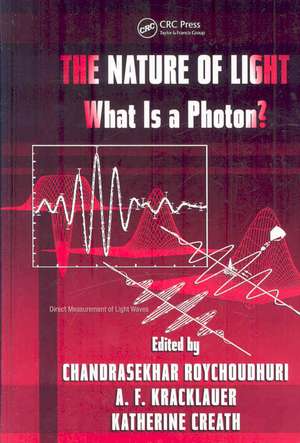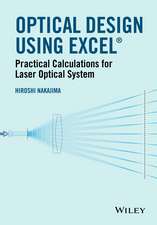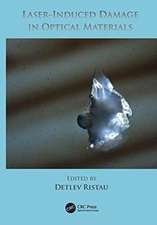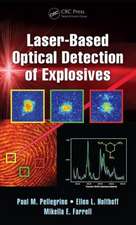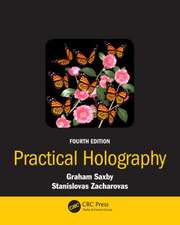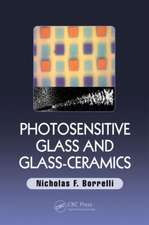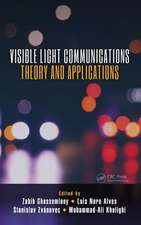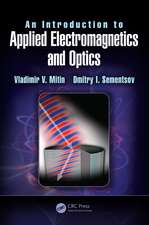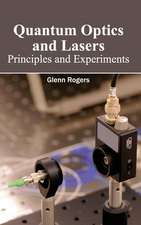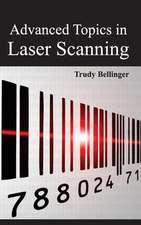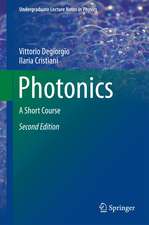The Nature of Light: What is a Photon?
Editat de Chandra Roychoudhuri, A.F. Kracklauer, Kathy Creathen Limba Engleză Hardback – 25 iul 2008
Looking at photons from both mainstream and out-of-box viewpoints, this volume is sure to inspire the next generation of quantum optics scientists and engineers to go beyond the Copenhagen interpretation and formulate new conceptual ideas about light–matter interactions and substantiate them through inventive applications.
| Toate formatele și edițiile | Preț | Express |
|---|---|---|
| Paperback (1) | 489.26 lei 6-8 săpt. | |
| CRC Press – 25 sep 2019 | 489.26 lei 6-8 săpt. | |
| Hardback (1) | 1283.60 lei 6-8 săpt. | |
| CRC Press – 25 iul 2008 | 1283.60 lei 6-8 săpt. |
Preț: 1283.60 lei
Preț vechi: 1565.37 lei
-18% Nou
Puncte Express: 1925
Preț estimativ în valută:
245.65€ • 255.51$ • 202.80£
245.65€ • 255.51$ • 202.80£
Carte tipărită la comandă
Livrare economică 14-28 aprilie
Preluare comenzi: 021 569.72.76
Specificații
ISBN-13: 9781420044249
ISBN-10: 1420044249
Pagini: 452
Ilustrații: 96 b/w images, 1 table and 421 equations
Dimensiuni: 156 x 234 x 28 mm
Greutate: 0.77 kg
Ediția:1
Editura: CRC Press
Colecția CRC Press
ISBN-10: 1420044249
Pagini: 452
Ilustrații: 96 b/w images, 1 table and 421 equations
Dimensiuni: 156 x 234 x 28 mm
Greutate: 0.77 kg
Ediția:1
Editura: CRC Press
Colecția CRC Press
Public țintă
Academic and Professional Practice & DevelopmentCuprins
Light Reconsidered. What Is a Photon?. What Is a Photon?. The Concept of the Photon—Revisited. A Photon Viewed from Wigner Phase Space. Inevitable Incompleteness of All Theories: An Epistemology to Continuously Refine Human Logics Toward Cosmic Logics. “Single Photons” Have Not Been Detected: The Alternative “Photon Clump” Model. What Is a Photon?. Oh Photon, Photon, Whither Art Thou Gone?. A Conclusive Experiment on Wave-Particle Duality of Light?. The Photon Wave Function. Photons Are Fluctuations of a Random (Zeropoint) Radiation Filling the Whole Space. Violation of the Principle of Complementarity and Its Implications. The Bohr Model of the Photon. The Maxwell Wave Function of the Photon. Modeling Light Entangled in Polarization and Frequency: Case Study in Quantum Cryptography. Photon–The Minimum Dose of Electromagnetic Radiation. Propagating Topological Singularities: Photons. The Photon: A Virtual Reality. The Photon and Its Measurability. Phase Coherence in Multiple Scattering: Weak and Intense Monochromatic Light Wave Propagating in Cold Strontium Cloud. The Nature of Light: Description of Photon Diffraction Based upon Virtual Particle Exchange. What Physics Is Encoded in Maxwell’s Equations?. From Quantum to Classical: Watching a Single Photon Become a Wave. If Superposed Light Beams Do Not Redistribute Their Energy in the Absence of Detectors (Material Dipoles), Can a Single Indivisible Photon Interfere?. What Processes Are behind Energy Redirection and Redistribution in Interference and Diffraction?. Do We Count Indivisible Photons or Discrete Quantum Events Experienced by Detectors?. Direct Measurement of Light Waves. Index.
Notă biografică
Chandrasekhar Roychoudhuri, A. F. Kracklauer, Katherine Creath
Descriere
Gathering contributions from globally recognized specialists in electrodynamics and quantum optics, this volume continues the debate on the definition of a photon and the concept of wave-particle duality. After covering the mainstream view of the nature of light and photons, it presents a new and challenging scientific epistemology that explains how to overcome the prevailing paradoxes and confusions arising from the accepted definition of a photon as a monochromatic Fourier mode of the vacuum. It concludes with an array of experiments that demonstrate the innovative thinking needed to examine the wave-particle duality of photons.
